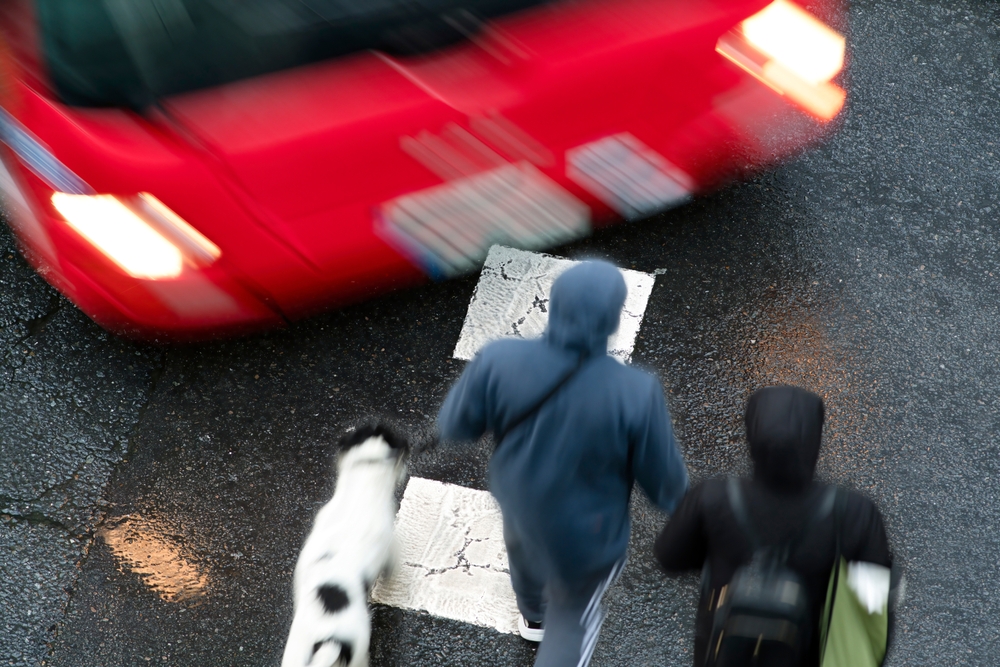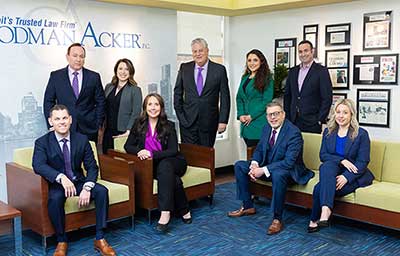- January 15, 2021
 No one plans for a car crash. One minute you're driving, maybe through a busy Southfield intersection or a quiet Michigan neighborhood, and the next, you’ve hit someone. Your heart races. Panic sets in. Did you just end someone’s life? Are you going to jail? These questions hit like a ton of bricks.
No one plans for a car crash. One minute you're driving, maybe through a busy Southfield intersection or a quiet Michigan neighborhood, and the next, you’ve hit someone. Your heart races. Panic sets in. Did you just end someone’s life? Are you going to jail? These questions hit like a ton of bricks.If you're asking, "Can you go to jail for accidentally hitting someone with your car in Michigan?", you're not alone. Many drivers have made honest mistakes that have led to devastating results. And while you may not have meant to cause harm, that doesn’t always stop the legal system from treating you like you did.
Michigan has unique laws around car accidents and liability. The system might shield you from a lawsuit in some situations, but not always from criminal charges. Some accidents remain civil matters. Others could lead to jail time.
If you've been in this situation or you're worried about the legal consequences, don't wait. Contact a Detroit Pedestrian Accident Lawyer as soon as possible. A free consultation can provide clear answers so you can move forward with confidence.
Understanding Michigan's Vehicle Accident Laws
 Michigan law looks at both civil and criminal sides of a car accident. Not every crash leads to a courtroom, but certain details, like alcohol use or reckless behavior, can change everything.
Michigan law looks at both civil and criminal sides of a car accident. Not every crash leads to a courtroom, but certain details, like alcohol use or reckless behavior, can change everything.
Criminal vs. Civil Liability in Car Accidents
Car accidents often fall into two categories: civil or criminal.
In civil cases, someone sues for damages like medical bills or lost income. The question is usually whether a driver was careless.
Criminal cases, on the other hand, deal with whether the law was broken. Prosecutors might charge someone if they believe the driver acted recklessly, drove under the influence, or ignored traffic laws in a way that caused serious harm. Get an Attorney for a Car Accident as soon as possible to make sure your rights are protected during this process.
Key Legal Concepts: Negligence, Recklessness, and Intent
Negligence means a driver didn’t use reasonable care. Think texting at a stoplight and not seeing a pedestrian. That’s careless, not intentional.
Recklessness takes it a step further. It involves willful disregard for safety. For example, speeding through a school zone even though kids are present.
Intent means a driver meant to cause harm, which rarely comes up in accident cases unless someone used a car as a weapon.
Michigan’s No-Fault Insurance System Impact
Michigan uses a no-fault system, which means drivers usually turn to their own insurance first for medical bills and lost wages, regardless of who caused the crash.
This doesn’t mean you’re free from responsibility. If someone dies or suffers a serious injury, the case might move beyond no-fault rules. And the police could still investigate you for criminal conduct.
Can You Face Criminal Charges for an Accidental Car Collision?
Yes. Even if the crash was unintentional, prosecutors can bring criminal charges depending on how the accident happened and what they find during the investigation.
When Accidents Become Criminal Matters
Not every accident leads to criminal charges. But when a driver breaks traffic laws, drives impaired, or shows signs of reckless behavior, it can turn criminal fast.
For example, if someone runs a red light and hits a pedestrian, that driver might be charged, even if they didn’t mean to cause harm.
Misdemeanor vs. Felony Charges in Michigan
Some driving offenses are misdemeanors, such as a moving violation that causes minor injury. Others rise to the level of felonies, especially if someone dies or is seriously hurt.
Felony charges bring higher penalties, including years in prison. The type of charge depends on the outcome of the crash and your behavior behind the wheel.
The Role of Intent in Criminal Prosecution
Intent plays a big part. If you truly didn’t mean to hit someone, that may weigh in your favor. However, prosecutors look at whether you acted recklessly or ignored clear safety rules.
Intentional harm is rare in car crash cases. Most criminal charges come from reckless or negligent behavior, not from a plan to injure.
What Are the Specific Criminal Charges You Could Face?
If someone was seriously injured or killed, prosecutors may pursue one or more of these charges.
Moving Violation Causing Death (MCL 257.601d)
This charge applies when a driver commits a traffic violation and causes someone’s death. The driver may not have been reckless, but a mistake, like failing to yield, can still lead to serious consequences.
This is a misdemeanor and can result in up to one year in jail and a fine of up to $2,000.
Reckless Driving Causing Death or Serious Injury
Reckless driving means you showed a disregard for the safety of others. If that behavior leads to someone’s death, the charge becomes a felony.
Penalties include up to 15 years in prison and thousands in fines. Even without a death, serious injury can still bring up to 5 years of prison time.
Involuntary Manslaughter Charges
Involuntary manslaughter usually applies when someone acts with gross negligence that leads to another person’s death.
This charge goes beyond a traffic violation and suggests a serious lapse in judgment. Conviction can result in up to 15 years in prison.
Operating Under the Influence (OUI) Related Charges
If alcohol or drugs played a role in the crash, OUI charges will likely follow. Michigan law takes drunk and drugged driving seriously.
Even a first-time offense causing injury or death can lead to years in prison, license revocation, and a felony on your record.
What Factors Determine Whether You'll Be Charged Criminally?
Prosecutors look at the full picture when deciding to press charges. They don't just look at the result of the crash but also how it happened.
Evidence of Negligence or Recklessness
Were you speeding? Looking at your phone? Ignoring a stop sign? Any of these can support a claim of negligence. Add excessive speed, racing, or aggressive driving, and prosecutors may call it recklessness instead. What Can You Do After depends on the facts of the case, but speaking with an attorney early can make a difference.
Presence of Alcohol or Drugs
If police suspect alcohol or drug use, they’ll likely test your blood or breath. A high BAC or the presence of drugs increases the chance of criminal charges, sometimes even if your actions didn’t cause the crash directly.
Traffic Law Violations at Time of Accident
Running a red light, failing to yield, or ignoring other traffic signs can lead to charges if someone gets hurt. These actions form the legal foundation for negligence or recklessness.
Severity of Injuries or Fatalities
The more serious the injuries, the more likely prosecutors are to pursue criminal charges. Fatalities almost always lead to some level of investigation and, in many cases, charges.
Penalties and Consequences of Criminal Charges
Being charged after a car accident isn’t just about jail time. The impact can spread across every part of your life.
Jail Time and Prison Sentences
Misdemeanor charges might carry up to a year in jail. Felonies bring much steeper penalties, such as 5, 10, or even 15 years in prison, depending on the charge and the situation.
Fines and Financial Penalties
Fines can range from hundreds to thousands of dollars. You might also have to pay court costs, restitution to the injured person or family, and higher insurance premiums for years to come. Deal With Insurance Adjusters carefully during this time, as their goal is often to minimise payouts.
License Suspension and Driving Restrictions
Some charges include automatic license suspension. Others allow the court to place restrictions on when and where you can drive. Losing your license can make daily life much harder.
Long-term Impact on Employment and Records
A criminal conviction affects your future job prospects. Employers may avoid hiring someone with a criminal record. The conviction could also block you from working in certain professions or cause issues with professional licensing.
How Can You Protect Yourself After an Accident?
The decisions you make right after a crash matter. Here’s what you should know.
Immediate Steps at the Scene
Stay at the scene. Call 911. Check on others. If it's safe, take photos of the crash and gather names of any witnesses. Never leave before the police arrive unless you need emergency care.
Dealing with Police Investigation
Be polite, but remember you don't have to say more than necessary. Anything you say could show up later in court. Stick to the basics when answering questions.
When to Exercise Your Right to Remain Silent
You don’t have to answer every question. If the police start asking about what you were doing before the crash or suggest you were reckless, ask for a lawyer. You have that right. Use it.
Importance of Legal Representation
Getting legal help early can protect your future. A Detroit Pedestrian Accident Lawyer can deal with police, review the evidence, talk to witnesses, and help stop charges before they’re even filed.
How Our Attorneys Can Help
If you accidentally hit someone with your car in Michigan, you may be dealing with more than just emotional stress. The injured person or their family may file a personal injury claim against you. Insurance companies may try to shift full blame onto you, even if the facts show otherwise. That’s where our legal team steps in.
At Goodman Acker PC, we represent drivers involved in car accidents where serious injuries or fatalities occurred. Even if the crash was unintentional, a personal injury claim can bring serious financial consequences. Medical bills, lost income, and long-term care costs for the injured party can all be brought into the equation. We help you deal with these issues head-on.
Our attorneys handle the legal side so you don’t have to figure everything out alone. We gather and review police reports, crash scene photos, witness statements, black box data, and traffic camera footage to build a clear picture of what really happened. This helps us dispute exaggerated claims and present your version of events backed by solid evidence.
We also deal directly with insurance companies. Whether it's your insurer or the other party's, our team steps in to handle communication and negotiations. That way, no one can twist your words or pressure you into accepting full responsibility without a fight.
If the injured party is seeking compensation, we work to protect your financial interests. That includes reviewing policy limits, monitoring liability exposure, and fighting back against inflated damages as part of negotiating a fair Car Accident Settlement.
We understand how much a serious accident can disrupt your life. Our job is to protect your rights and push for the best possible outcome, whether that means reducing your financial liability or helping you avoid paying beyond what the law requires.
With Goodman Acker PC by your side, you don’t have to manage this situation alone. We’ve helped thousands of Michigan drivers through the aftermath of serious crashes, and we’re ready to help you too.
Frequently Asked Questions
What if I was texting while driving when the accident occurred?
Texting while driving can be used as evidence of negligence. If someone was injured or killed, prosecutors might use it to build a criminal case. You should speak to a defense lawyer right away.
Can I be charged if the other driver was also at fault?
Yes. Even if the other driver shares blame, you can still be charged if your actions contributed to the crash. Michigan allows for multiple parties to be held responsible in an accident.
How long do prosecutors have to file charges against me?
The statute of limitations varies depending on the charge. For most felonies in Michigan, prosecutors have up to six years to file charges, but it’s best to speak to an attorney immediately after the accident.
Will my insurance cover criminal defense costs?
No. Most auto insurance policies don’t cover criminal defense. You’ll need to hire a criminal defense attorney on your own.
What’s the difference between a hit-and-run and leaving the scene?
They mean the same thing. Michigan law requires drivers to stop and report an accident. Leaving without doing so can lead to separate felony charges, even if the accident wasn’t your fault.
Get the Legal Help You Need Now
 If you accidentally hit someone with your car, your freedom, future, and finances are all at stake. The sooner you talk to a Detroit Pedestrian Accident Lawyer, the more options you’ll have.
If you accidentally hit someone with your car, your freedom, future, and finances are all at stake. The sooner you talk to a Detroit Pedestrian Accident Lawyer, the more options you’ll have.At Goodman Acker PC, we treat every case with the urgency it deserves. We don’t wait for things to get worse. We step in right away and get to work.
Contact us now for a free, confidential consultation. There’s no risk in getting answers, and the call alone could shape the outcome of your case. Don’t wait until charges are filed or decisions are made without your input. Let us help you protect everything you’ve worked for.

